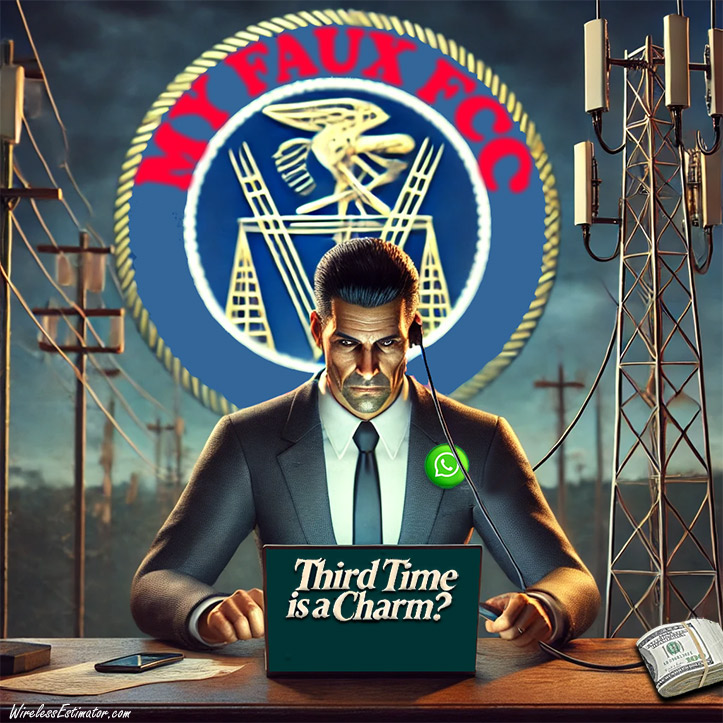
IF, AT FIRST, YOU DON’T SUCCEED, TRY, BUT DON’T GET TRIED AGAIN – A Puerto Rican 57-year-old man has pled guilty to scamming investors for the second time for thinking they were paying for FCC licenses that would provide generous monthly incomes.
A man previously convicted for orchestrating a multi-million-dollar cellular tower investment fraud, after serving years in jail, once again has found himself behind bars.
Miguel Merced-Torres, 57, who served six years in prison for his role in a $14.2 million Ponzi scheme, has admitted to carrying out a near-identical scam, defrauding unsuspecting investors while still under supervised release. His second arrest and conviction have drawn attention to the repeated exploitation of FCC-related investment opportunities.
History repeats: Second arrest for nearly identical crime

MAYOR FALLS FOR PONZI, DIES AFTER BRIBERY CONVICTION – Victor Ortiz-Diaz, the mayor of Gurabo, Puerto Rico, became one of the victims of Miguel Merced-Torres’ first FCC cell tower Ponzi scheme, investing $125,000 that he had illegally solicited from a contractor back in 2012. In November 2020, following a four-day trial, Ortiz-Diaz was convicted on one count of bribery. His sentencing, scheduled for July 2, 2020, could have landed him up to 10 years in prison. However, no clear record indicates whether the sentencing occurred before U.S. District Court Judge Jay A. García-Gregory, who also sentenced Merced-Torres to six years for his earlier fraud convictions. Ortiz-Diaz passed away on November 3, 2021, possibly while serving his sentence, though the circumstances surrounding his death and where it occurred remain unexplained.
Merced-Torres’ latest fraud closely mirrors the scheme that led to his 2015 conviction. Using similar tactics, Merced-Torres convinced victims to invest in a phony communications tower venture under the guise of obtaining lucrative Federal Communications Commission (FCC) licenses.
However, as with his previous scam, the FCC does not issue such licenses for tower construction to anyone other than a legitimate applicant, such as a broadcaster or a cell tower owner.
Merced-Torres established MAM Construction, Inc. in July 2020 in Puerto Rico, setting the stage for another fraudulent operation. From July 2021 through December 2022, Merced-Torres used the mobile application WhatsApp to connect with potential investors, representing himself as having secured FCC licenses for communications towers that would generate between $5,000 to $40,000 per month in profit.
According to court documents, Merced-Torres deceived at least four people, accumulating $194,786.46 in ill-gotten funds. One prospective investor, however, refused to hand over the requested $55,438.35 after sensing something was amiss.
Merced-Torres’ fraudulent tactics were methodical. He claimed that investors could earn substantial profits from towers that would support mobile phone and internet services.
To bolster his deception, he used legitimate registration numbers belonging to third parties, making his claims appear authentic. The unsuspecting victims believed they were securing a profitable FCC license that could lead to a lifetime of returns.
He also charged additional fees for obtaining state and federal permits that supposedly granted the investors a permanent FCC license for tower construction.
Once the victims transferred funds to MAM Construction’s bank account, Merced-Torres would funnel the money into his personal account, adding layers to the fraud.
In addition to the financial loss, Merced-Torres collected personal information from his victims and even coerced them into signing contracts, which were prepared with the help of another unidentified individual referred to in the indictment as “Individual A.”
On Thursday, Merced-Torres pled guilty in U.S. District Court for the District of Puerto Rico to one count of wire fraud. The charges, part of a larger seven-count indictment, mark a pivotal moment in a case that uncannily resembles his first crime. Prosecutors have agreed to recommend a 33-month prison sentence for Merced-Torres, who is slated for sentencing on December 10. He could receive a sentence of up to 20 years in prison.
A convicted fraudster’s history
Merced-Torres’ criminal career began in the early 2010s when he first ran an elaborate Ponzi scheme that defrauded numerous individuals through his company, MM Technology Wireless Group. Posing as a representative of the FCC, he convinced investors to contribute funds to support the construction of cellular towers.
His promises were bolstered by fake FCC emails from a self-created account, “fcc@mmtwgroup.com,“ which he used to send fabricated updates about delays in the FCC’s approval process.
In the earlier case, when investors began to question the delays in tower construction, Merced-Torres made a series of increasingly outlandish excuses. He cited fabricated FBI investigations, incorrect dates for contract signings, and even claimed that a key FCC official was involved in a serious car accident and remained in a coma.
Despite these excuses, Merced-Torres maintained the fraud for years, even providing partial payments to victims to keep the scheme afloat.
Ultimately, his web of lies unraveled, leading to his conviction in 2015. U.S. District Judge Jay A. García-Gregory sentenced him to six years in federal prison, followed by three years of supervised release.

















